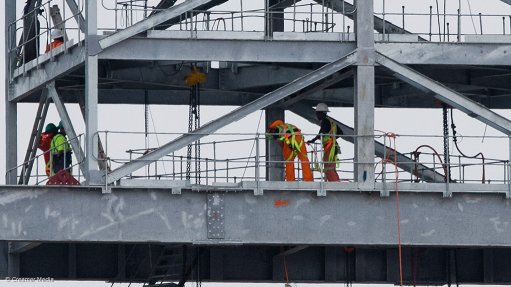
BAKUBUNG PLATINUM MINE The project is scheduled to start production by the end of 2018, ramping up to full capacity by October 2020
Photo by: Duane Daws
JSE-listed junior platinum-group metals (PGMs) mining company Wesizwe Platinum is developing its fully funded Bakubung platinum mine project in the North West, which is a positive sign to investors that South Africa will remain a long-term supplier of platinum, argues independent mining consultancy Core Consultants MD Lara Smith.
“Hopefully, the number of new North West platinum projects in the pipeline, such as Bakubung, Impala Platinum’s (Implats’) No 16, 17 and 20 Shaft complexes, Bafokeng Rasimone Platinum Mine’s North Shaft Merensky Phase 3 project and the Styldrift 1 expansion, as well as TSX- and NYSE-listed Platinum Group Metals’ (PTM’s) Western Bushveld Joint Venture (WBJV) Project 1, will influence consumers to remain invested in South Africa and to continue their reliance on the local platinum industry, despite the recent labour unrest,” says Smith.
She adds that South Africa’s inability to consistently supply the local platinum consumer base, as well as international clients, has forced companies to seek alternative platinum sources, which may result in companies “divesting from South Africa altogether in future”.
“This will certainly have a knock-on effect on other local platinum-intensive sectors, such as jewellery and catalytic converter producers. “All local platinum producers, even those that were not directly affected by the strikes, have ultimately been affected, owing to investors’ concerns,” she states.
She laments that, from a consumer perspective, the automotive industry has “just about written South Africa off” in terms of its ability to supply the industry in the long term.
Smith points out that scenario planner Clem Sunter recently warned that, following the 2012 Marikana tragedy – which resulted in the deaths of 44 people, the majority of whom were striking mineworkers – the probability of the country becoming a failed State had risen in his estimation to 25%.
“If any form of mass divestment is to occur owing to the effects of the strike, then Sunter’s probability of South Africa [becoming] a failed state would certainly increase. “However, as an analyst, it is difficult for me to judge the current situation, as we are standing at a precipice, where things could go either way and, in fact, the industry may emerge stronger,” she says.
Nevertheless, Smith maintains that the local mining sector is considered to be a risky investment in the minds of foreign direct investors, owing to this year’s protracted strike action, which had still not concluded at the time of going to print.
“If for some reason the strike resumes or a new one starts, then this would inevitably result in mine closures, and it is unlikely that South Africa would recover in the medium term.”
Smith further warns that platinum mining companies’ future capital-raising initiatives may be jeopardised, owing to the likely possibility that investors will perceive the sector as being too risky.
She adds that the outcome of the strike has created a negative precedent for all platinum companies, which will ultimately limit the profitability of all future projects.
“Political and social risk and uncertainty are the main concerns when it comes to these projects, as investors like certainty and predictability,” says Smith.